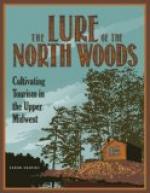His party was not alone, for soon after he got to work three men drove in their stakes behind his block of claims. They went south to file their records, and returning with several more, began the development the law required. Others followed, and the neighborhood was soon dotted with tents and discovery posts; but, for the most part, the men were satisfied with blasting a few holes in the surface of their claims. One or two experienced miners talked to Thirlwell, and agreeing that the ore could only be reached from the ground owned by Agatha’s Company, abandoned their holdings and went back; the others waited for a time, and then returned, disappointed, when their food was exhausted.
The first arrivals, however, stayed and had opened two or three rude shafts before the frost began. Then, instead of leaving, as Thirlwell expected, they brought up provisions and built a log shack. It was plain that they meant to hold the claims and Thirlwell was puzzled, because he saw the men were miners and thought they knew their labor was thrown away. He imagined that Stormont had sent them, but could not see the latter’s object. The fellow could hardly expect to reach the inclined vein except at a depth that would make it extremely expensive to work, and Thirlwell had improved his own and the adjoining claims enough to protect them legally from encroachment. Still Stormont was unscrupulous and it was possible he had some cunning plan for embarrassing the company. Thirlwell felt disturbed, but he had no grounds for interfering with the men, and although their relations were rather strained when they met, he left them alone.
CHAPTER XXXI
THIRLWELL’S REWARD
Winter was nearly over when, one evening, George and Scott arrived at the Farnam homestead where Agatha was a guest. The house was centrally heated, and when the party gathered in Mrs. Farnam’s pretty, warm room, Agatha wondered what Thirlwell was doing in the frozen North. Farnam had invested some money in the mine, and Agatha knew George had come to talk about the company’s business.
“Things are not going well with us,” he said presently. “Our money’s nearly spent and Thirlwell has not been able to get out much ore. I think I told you he suspected Stormont sent the men who staked the claims behind our block, and the fellow’s now getting on our track. He’s been to see Gardner, Leeson, and one or two others.”
“It would be awkward if they turned us down,” Farnam remarked.
Agatha waited. She knew Gardner and Leeson held a number of the shares, but she did not understand the matter yet.
“Very awkward,” George agreed. “I went to Leeson, and although he didn’t say much, I reckon Stormont wants to buy his stock. He allowed that he and Gardner were not satisfied about our prospects, and I couldn’t give him much ground for holding on. Then I went to Hill, who said he’d got an offer for his stock and meant to sell, but wouldn’t name the buyer. I suspected Stormont again, but we won’t know until we get the transfer form.”




